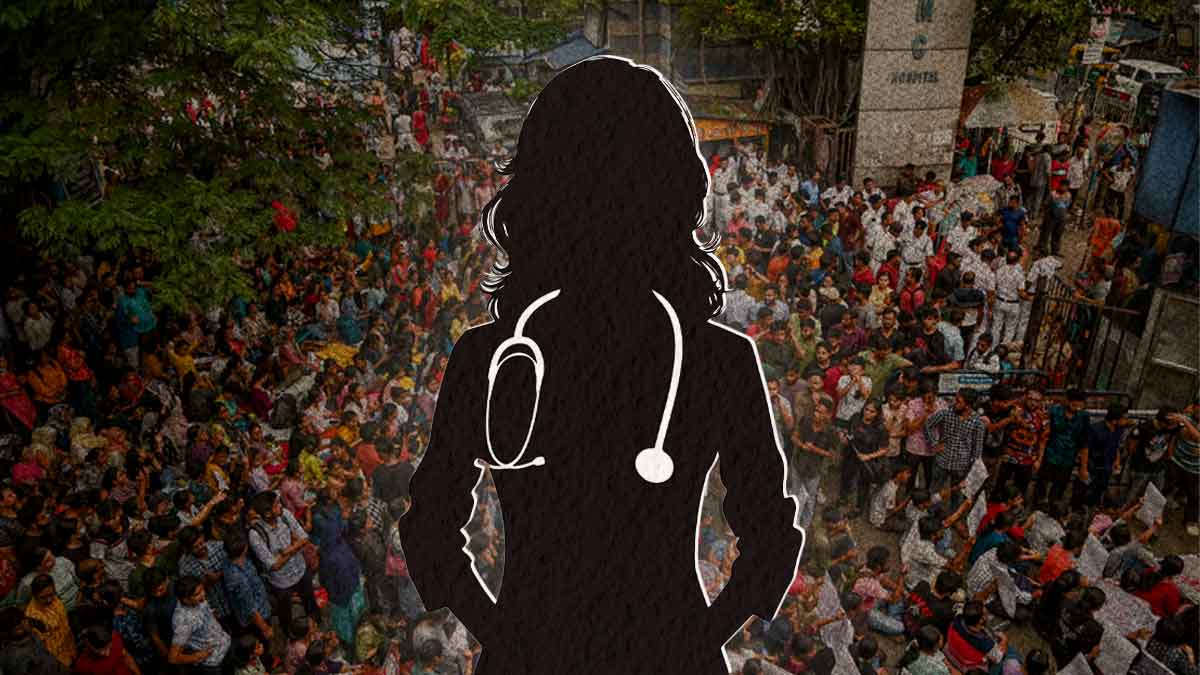
On August 9, a 31-year-old female doctor was brutally raped and murdered while on duty at RG Kar Medical College and Hospital. What followed was a disturbing series of events: authorities initially labeled it as a ‘suicide,’ her parents were allegedly made to wait for three hours before being allowed to see her body, and the college principal engaged in victim shaming. In response, mass protests erupted across the country, demanding justice.
A month later, young female doctors in Kolkata continue to work under a cloud of shock, fear, and anger.
“I was on duty in the same department during my internship, including night shifts. The incident haunts me; I haven't slept for nights thinking about it,” shared a female intern at RG Kar, who wished to remain anonymous.
She added, “I know a senior who worked in the same department as Abhaya (a pseudonym for the victim). She said, ‘It’s my good luck it didn’t happen to me, and her bad luck that it happened to her.’ Many of us feel like we’re just running on luck.” She emphasized that those working in the same hospital feel the attack could have happened to any one of them.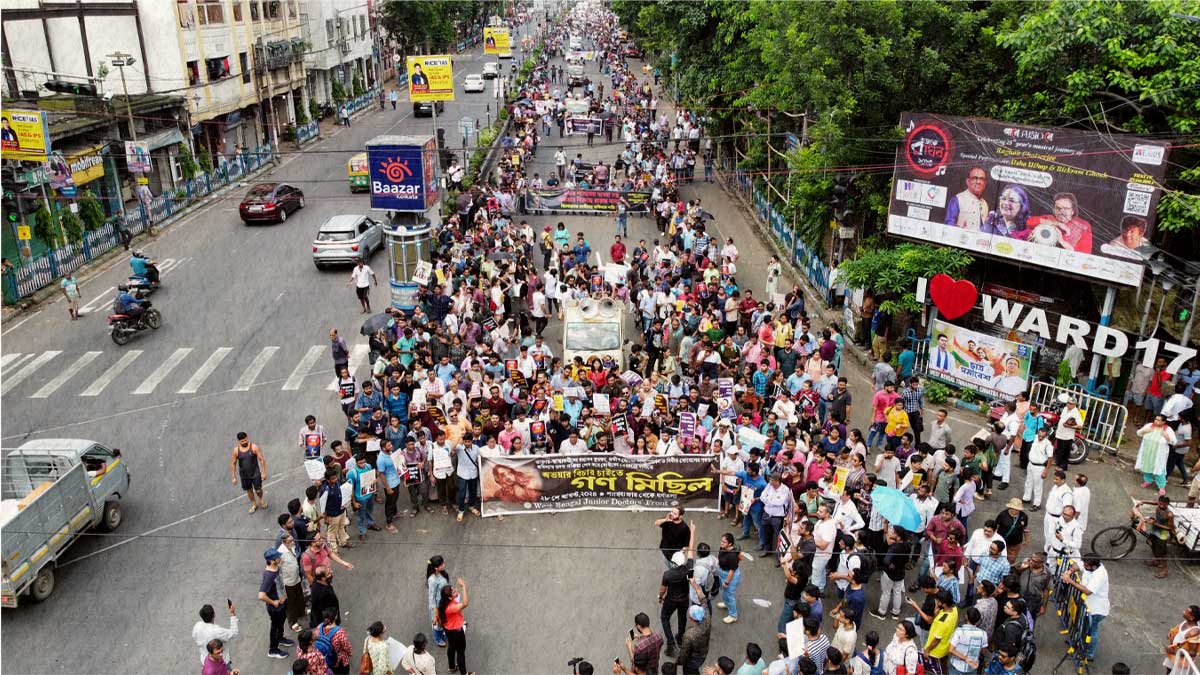
Since the tragic incident, doctors have been protesting daily, demanding justice. A stage and protest section has been set up at the hospital, with ongoing 24x7 demonstrations, while candlelight vigils and human chain protests continue across the city. Despite the public outcry and support, female doctors are deeply shaken and uncertain about what their workplace will feel like once the protests calm down. HerZindagi spoke to several women doctors in Kolkata to understand how they are coping with the aftermath of this tragedy.
Even a month later, only one arrest has been made, amidst ongoing rumors and theories suggesting the crime may have involved multiple perpetrators. The victim’s family has alleged that authorities rushed to cremate the body, despite their reservations.
“Everything about this crime is so heinous and still shrouded in uncertainty. We still have no idea what really transpired that night or how the investigation is progressing, and that fills us with fear,” said a female intern at RG Kar.
A profound sense of helplessness and fear dominates the atmosphere among most women doctors. With no clarity on the punishment for the accused or updates from the investigation, doctors express frustration over the delays in delivering justice.
“The barbarity of the act has left us reeling with a void we cannot even describe,” said Upoma, Senior resident, Dept of Medicine, Calcutta National Medical College & Hospital. “Second guessing every other person has taken over. Because deep within, all of us know that in her place it could have been any of us.”
For Prakriti Rudra, her sense of security has been irrevocably broken. “This incident has shattered the false sense of security we believed we had. No one is going to save us; it's our responsibility alone. It's better to remain alive as an average doctor than to die as a heroic one,” said the Assistant Professor at a government college in West Bengal.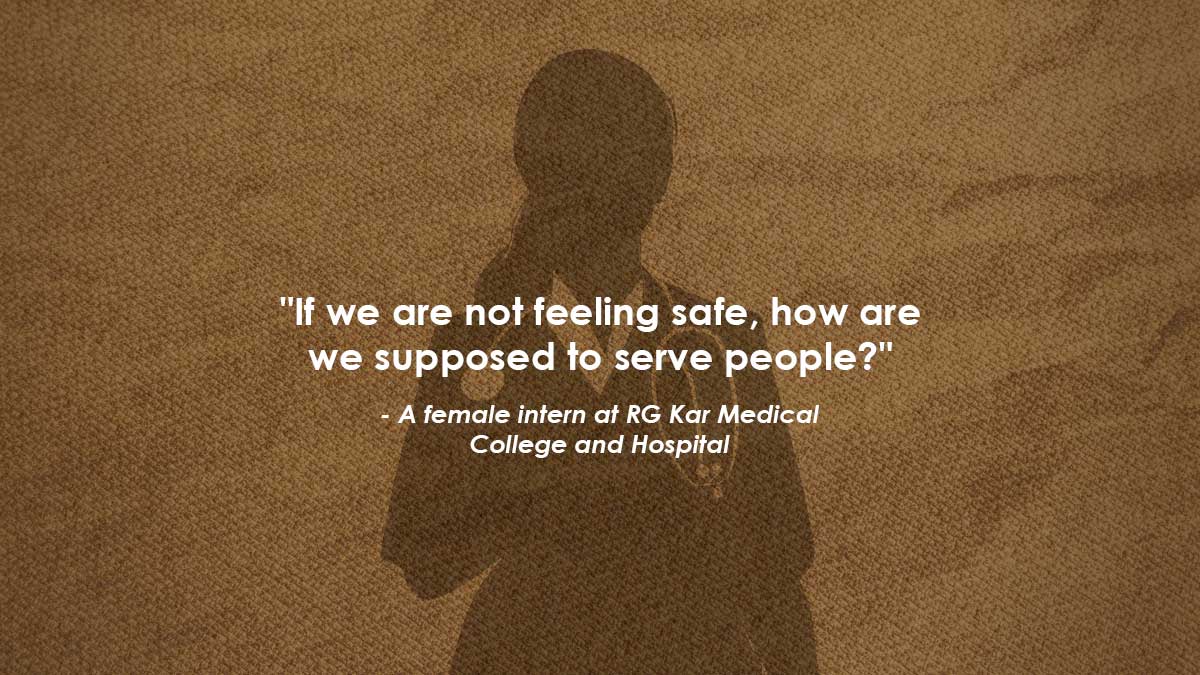
With Supreme Court hearing dates being deferred and political forces trying to overshadow the protests, the mental health of many doctors has also taken a severe toll.
“If we don't feel safe, how are we supposed to serve people?” asked the intern.
The doctors rued about security lapses that they’ve always witnessed but were quite normalised in the system.
“One, during night duty, I was alone in the working area doing some paperwork. A drunk patient party approached me, asking about his father's health. There was nobody around. He was drunk and seemed very aggrieved. I had to call for a security guard to come and escort him outside,” recounted the intern. “
The incident wasn’t new or uncommon.
“I informed my immediate seniors but nothing really came out of it. There have been numerous incidents when we have had drunk patients come into our trauma centre. There have been cases where they've tried to click our pictures and all. We have normalized things like this, where drunk patients or patient parties may come and harass us,” she said.
Paroma Mukherjee, who studied and trained at a government hospital, faced a similar situation. “There have been multiple times when on duty at night, I have had to face a group of drunk men accompanying the patient, walking right into the duty room. When going to see refers late at night in the dark, it surely felt a bit scary,” she said.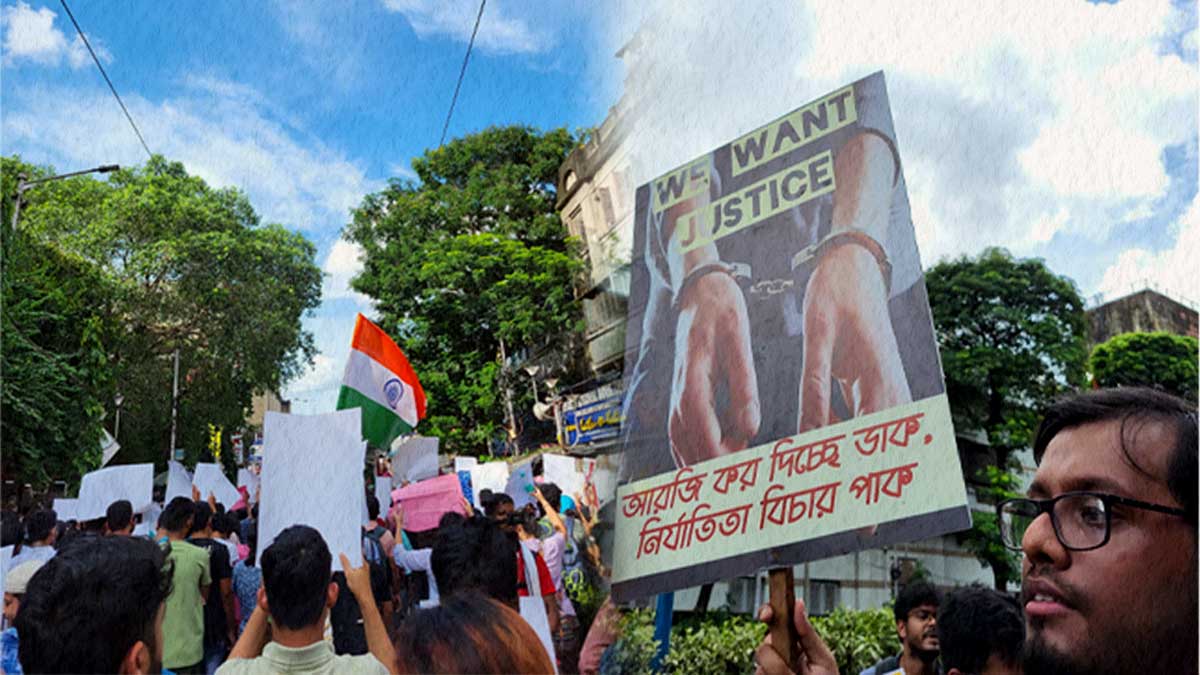
Paroma, who works as a Senior Resident, Dept of ENT, NRS Medical College and Hospital Kolkata, added that outsiders have pretty much unbridled access inside the hospital. “They issue a gate pass for patient parties to move around, and there is some security. But norms aren’t followed much really, and usually people move around from one area to another quite freely.”
Upoma added, “Proper clean on-call room, clean washrooms, security personnel, well-lit corridors, limiting patient access everywhere - all are missing right now.”
In the aftermath of the incident, the West Bengal government launched a flagship program aimed at making workspaces safer for women across the state. Among other measures, such as apps, alarms, reduced work hours, and volunteers, it also recommended minimizing “assigning them night duty as much as possible.”
However, doctors collectively voiced concerns that reducing their working hours is not a viable solution and could likely hinder their experience and professional growth.
“How can a doctor or nurse avoid night shifts? That would be denying basic rights to equality,” said Upoma. “Major surgical operations take place during night shifts, and critical cases are handled then. As students, would we miss out on such opportunities? And what about female-predominant departments like obstetrics and gynecology? Would they remain closed at night?”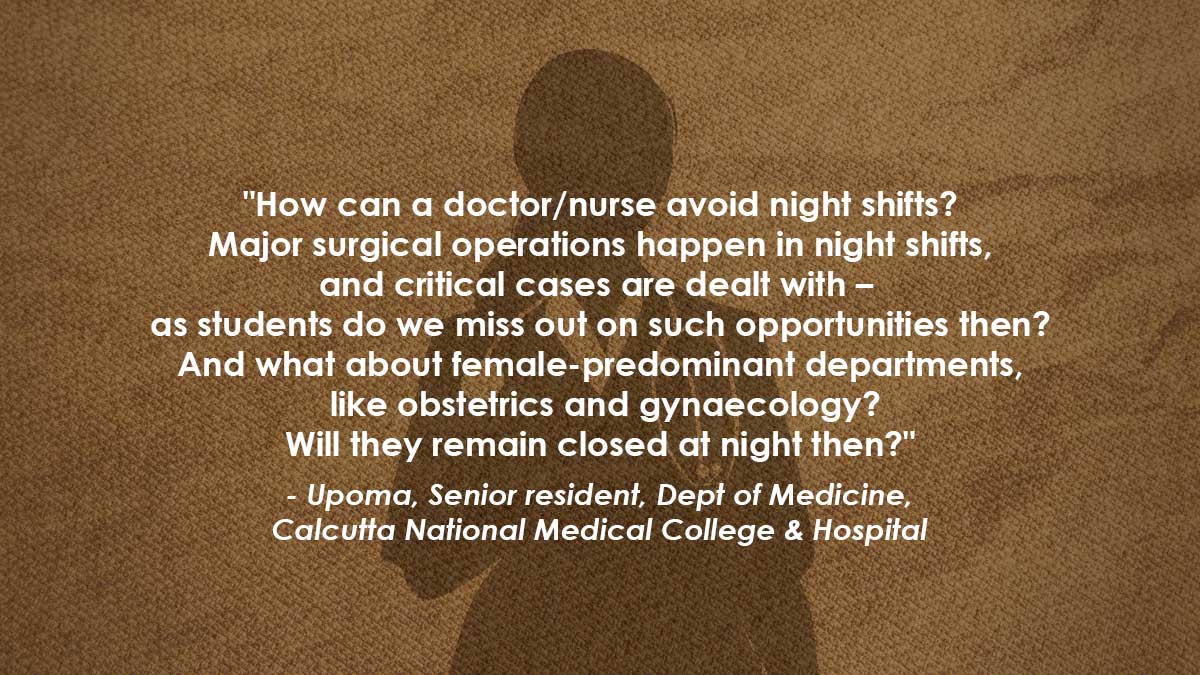
The intern shared how they used to move freely around the campus at all hours without fear, going from one building to another, but now that sense of freedom is gone. Her parents, too, have urged her to return home before it gets too late, which has curtailed her independence.
“I used to have a hostel room for nights when I could sneak in a few hours of sleep, but now my parents have forbidden me from staying there,” she said. She described how the hostels are now mostly empty after a mob entered the campus during a protest on the night of August 14.
The female doctors spoke about how casual sexism was always a part of their daily jobs, but they never imagined it could take such a violent turn.
Upoma pursued both undergraduate and postgraduate courses in government colleges. “We have dealt with kinds of situations no normal person dreams of. While having grown resilient over the years, to understanding the complexities of dealing with rowdy drunk crowds, we have faced it all. Glaring security lapses have always been present, resting places and clean washrooms being a luxury. Workplace abuse of doctors have become commonplace in India over the last few years, which is unheard of in any other country for that matter,” she said. 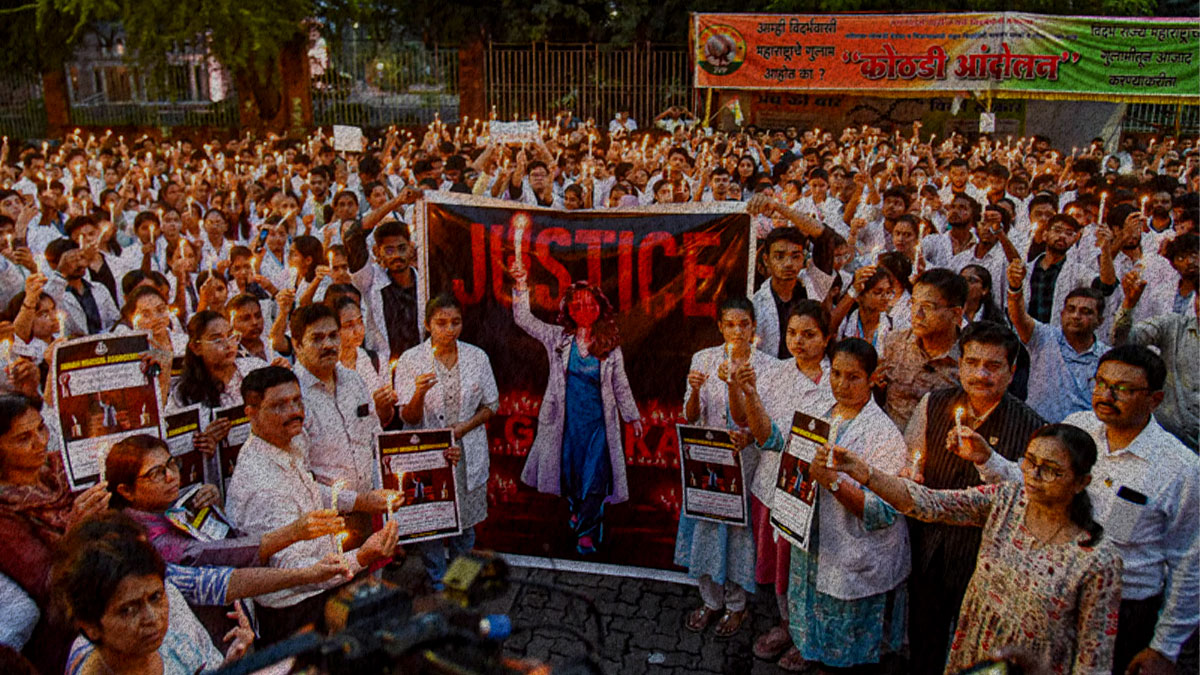
The intern also highlighted how patient parties treat them as ‘sisters’ and often mistake them for nurses. They also address male doctors as ‘doctor’ or ‘sir’ but call female doctors ‘didi’. “Sometimes they openly approach a male intern, over us,” she said referring to the rampant casual sexism they face.
They also spoke about the lack of proper resting rooms for doctors.
“During night duty, I used to sleep in the on-call room, with four beds. But they weren’t exclusively for women, so the other beds could be occupied by males. The on-call room also had a water dispenser, which meant that staff from all levels and genders would frequently enter the room. I’d feel safer if we had a women-only resting room, with a mechanism to have a bell or lock, for safety,” said the intern.
Instead of curbing women’s night duties, doctors said that maybe being assigned duty in groups or in the attendance of senior doctors, may help drive away their fear.
Paroma added, “I think the mentality of the people needs to change first, only then can other things change. The administration should ensure adequately equipped security personnel, functioning CCTV cameras, proper washrooms and duty rooms for the doctors.”
The authorities in some cases have promised the installation of CCTV cameras, and the doctors hope that the implementation of those happen as soon as possible.
Prakriti Samaddar said, “There should be tight security for doctors, and stringent laws punishing offenders.”
Also watch this video
Herzindagi video
Our aim is to provide accurate, safe and expert verified information through our articles and social media handles. The remedies, advice and tips mentioned here are for general information only. Please consult your expert before trying any kind of health, beauty, life hacks or astrology related tips. For any feedback or complaint, contact us at [email protected].